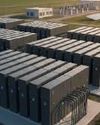Try GOLD - Free
ADVANCED INVERTER TECHNOLOGY POWERS A BRIGHTER RENEWABLE FUTURE
EPR Magazine (Electrical & Power Review)
|May 2025
From hybrid inverters to AI-driven technologies, the innovations are redefining energy production and consumption in unimaginable ways.
-

As the world increasingly turns toward renewable energy to combat climate change and achieve sustainability, inverters have become central to managing the smooth integration of solar power into the grid. Traditionally considered a simple device to convert DC to AC, modern inverters have evolved into sophisticated systems that manage energy efficiently, stabilise grids and play a crucial role in power generation from renewable sources. From hybrid inverters to AI-driven technologies, these innovations transform energy production and consumption in unimaginable ways. Let us take a closer look at the advancements in inverter technology and how the companies in the sector are leading the charge.
Power Factor Correction and Hybrid Inverters
Power factor correction (PFC) is a fundamental engineering concept that often goes unnoticed but is crucial for efficient grid functioning. A poor power factor leads to unnecessary energy losses and places an added burden on grid infrastructure. “When the power factor is low, you are drawing more current than necessary to do the same work, hence reducing losses and burdening the grid and transformer infrastructure,” says Ganesh Moorthi, Chief Technology Officer at Luminous Power Technologies.
Luminous has been at the forefront of this issue by designing solar inverters with a near-unity power factor for hybrid and on-grid systems. This innovative design helps utilities manage voltage levels more effectively, reduce line losses, and provide fewer interruptions, especially in areas with a high concentration of residential solar. Moorthi explains, “At Luminous, we make solar inverters in such a way that they have a near-unity power factor even under dynamic load conditions.”
This story is from the May 2025 edition of EPR Magazine (Electrical & Power Review).
Subscribe to Magzter GOLD to access thousands of curated premium stories, and 10,000+ magazines and newspapers.
Already a subscriber? Sign In
MORE STORIES FROM EPR Magazine (Electrical & Power Review)

EPR Magazine (Electrical & Power Review)
Wirepas certification a major step toward India's upcoming phase of AMI deployments
The Wirepas Certified programme is a major advancement for India's massive AMI deployments. This affirms device suitability for the diverse and challenging environments in the country. Teppo Hemiä, CEO of Wirepas discusses more with EPR.
2 mins
December 2025

EPR Magazine (Electrical & Power Review)
BESS becoming the backbone of power capacity additions
India is undergoing a rapid clean energy revolution, aiming to deploy 500 GW of non-fossil capacity by 2030, of which it has already reached 250 GW.
6 mins
December 2025

EPR Magazine (Electrical & Power Review)
Transformer industry undergoes evolution to meet capacity addition
The projected increase of over 433,000 MVA in substation capacity nationwide has served as a guiding force for the transformer sector. Amit Varshney shares his expertise in talks with EPR.
3 mins
December 2025

EPR Magazine (Electrical & Power Review)
RenewSys elevates solar module reliability with advanced encapsulant technologies
To enhance the efficiency and reliability of its products, RenewSys has introduced advanced encapsulants and backsheets, including AA EVA (Anti-Acid) to combat internal corrosion, ENT POE to guarantee PID-free performance, and environmentally friendly options like the Green Backsheet.
2 mins
December 2025
EPR Magazine (Electrical & Power Review)
REC facilitates MoU between MePDCL and CPRI for quality testing in Meghalaya
REC Limited, a Maharatna Public Sector Enterprise under the Ministry of Power and a leading NBFC, has successfully mediated a crucial Memorandum of Understanding (MoU) between Meghalaya Power Distribution Corporation Limited (MePDCL) and the Central Power Research Institute (CPRI).
1 min
December 2025

EPR Magazine (Electrical & Power Review)
SECI, Andhra finalise 1200 MWh BESS and 50 MW hybrid project
Solar Energy Corporation of India Limited (SECI), a Navratna CPSU under the Ministry of New & Renewable Energy (MNRE), Government of India, has exchanged Government Orders (GOs) with the Government of Andhra Pradesh for the development of a 1200 MWh Battery Energy Storage System (BESS) at Nandyal and a 50 MW Hybrid Solar Project.
1 min
December 2025

EPR Magazine (Electrical & Power Review)
Convergence of digitalisation, automation, and electrification is the foundation of next-gen infra
Panasonic Life Solutions India is on a mission to contribute to reliable, sustainable electrification across various sectors in the country. Shahab Naqvi shares insights about the company's strategies in talks with EPR. Let us know more from him.
3 mins
December 2025

EPR Magazine (Electrical & Power Review)
FY26 to attract $20-25 bn in renewable investments in India
The renewable energy sector in India has just hit a turning point. Between April and August 2025, the country added a record 20.1 gigawatts (GW) of renewable power capacity, a 123 per cent increase compared to the same period last year, when additions totalled just 9 GW. According to data from the Ministry of New and Renewable Energy (MNRE) and market observers like ICRA, this pace positions India to cross 35 GW of new capacity by the end of FY26, the highest annual addition in its clean-energy history.
3 mins
December 2025

EPR Magazine (Electrical & Power Review)
Wirepas certification a major step toward India's upcoming phase of AMI deployments
This certification provides DISCOMs and AMISPs with confidence that a device has passed the toughest real-world tests for scalability, interoperability and reliability.
2 mins
December 2025

EPR Magazine (Electrical & Power Review)
Renewable surge strains the grid as storage strengthens stability
The CEA mandates co-located ESS (approx. 2 hours) for new solar projects, aiming to reach 60 GW of storage by FY 2032 (including 42 GW of BESS and 19 GW of pumped hydro).
3 mins
December 2025
Listen
Translate
Change font size
